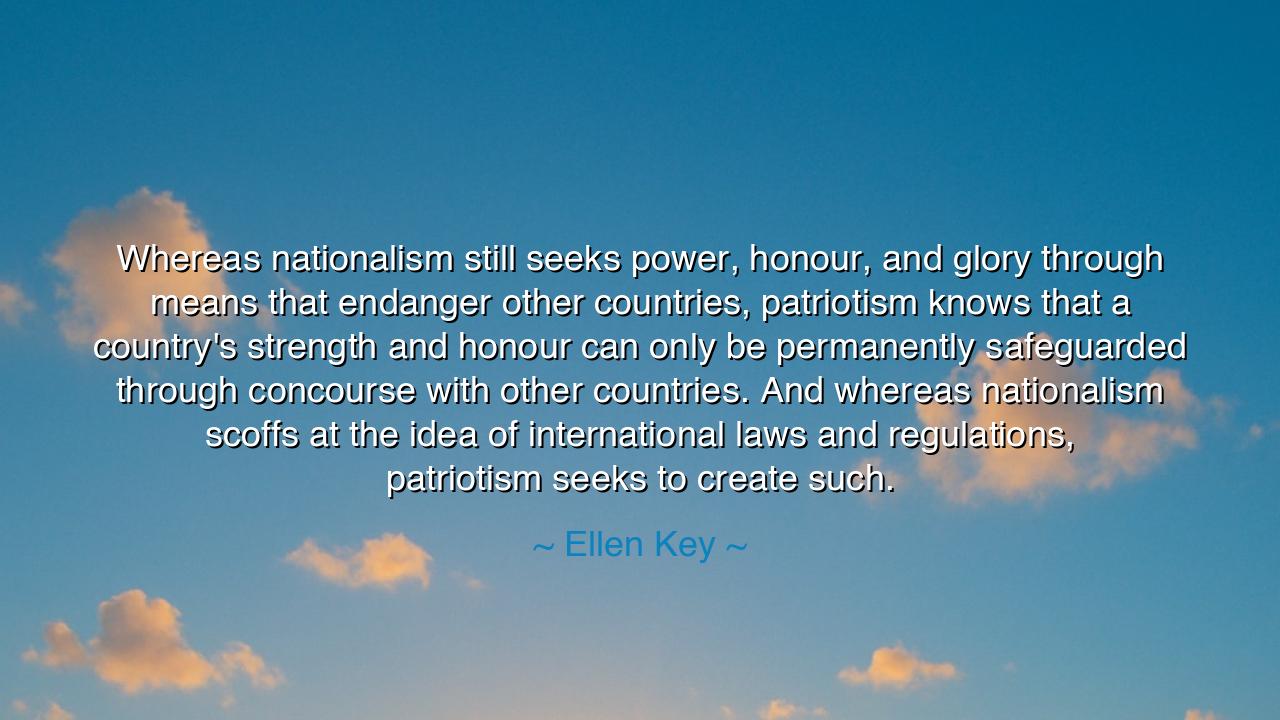
Whereas nationalism still seeks power, honour, and glory through
Whereas nationalism still seeks power, honour, and glory through means that endanger other countries, patriotism knows that a country's strength and honour can only be permanently safeguarded through concourse with other countries. And whereas nationalism scoffs at the idea of international laws and regulations, patriotism seeks to create such.






Ellen Key, the wise Swedish thinker, once proclaimed with clarity that cuts through the fog of politics: “Whereas nationalism still seeks power, honour, and glory through means that endanger other countries, patriotism knows that a country’s strength and honour can only be permanently safeguarded through concourse with other countries. And whereas nationalism scoffs at the idea of international laws and regulations, patriotism seeks to create such.” These words, though born of her time, rise above her century and speak with eternal resonance, warning of the dangers of arrogance and praising the higher path of unity and cooperation.
The origin of this saying comes from the turbulence of Europe in the late 19th and early 20th centuries, when nations sharpened their swords and pride swelled into dangerous excess. Ellen Key, who longed for a more humane society, saw that nationalism—with its hunger for conquest and its disdain for dialogue—was but a mask for rivalry and war. She contrasted it with patriotism, which does not grasp for domination but seeks harmony, believing that the true strength of a nation lies not in threatening others, but in standing with them, bound by trust and mutual law.
Her distinction is profound. Nationalism is like a fire that devours, burning brightly but consuming all it touches. It exalts itself at the expense of others, demanding sacrifice without wisdom, and glory without conscience. Patriotism, by contrast, is like a hearth-fire, warming its own home but also offering light to neighbors. It is rooted not in contempt but in respect, not in exclusion but in the recognition that one nation’s destiny is tied to the destiny of all. Where nationalism isolates, patriotism unites. Where nationalism defies law, patriotism builds it.
History confirms her wisdom. The First World War erupted from the arrogance of nationalist ambition—empires seeking power and glory, heedless of the destruction unleashed. Yet after the ashes of that war, the idea of international institutions arose: the League of Nations, and later the United Nations. Though flawed, these were attempts at what Ellen Key envisioned: not the scoffing of law, but the seeking of it, the belief that peace must be safeguarded not by threats, but by agreements honored across borders. The blood of millions became the price of ignoring her warning.
Consider also the example of post-war Europe, once divided by centuries of nationalism, but in time learning the strength of cooperation. Out of devastation rose the European Union, not perfect, but an attempt to replace the drums of war with the tables of dialogue. Nations that once shed each other’s blood now share trade, culture, and governance. This is Ellen Key’s patriotism made real: a recognition that honour is preserved not in isolation, but in shared humanity.
Her words also speak to our personal lives. How often does a man, blinded by pride, act as the nationalist, seeking to prove his superiority at the cost of harmony with others? And how much stronger is the man who acts as the patriot—who honors his family, his community, his land—yet does so with respect for those beyond his borders? True strength, whether of a person or a nation, is not found in crushing others, but in creating bonds that endure.
So let Ellen Key’s teaching endure for the generations: beware the false flame of nationalism, which promises glory but brings ruin. Choose instead the enduring fire of patriotism, which builds honor through justice and cooperation. And in your own life, let this mean seeking not victory at another’s expense, but peace through understanding; not disdain for law, but the building of it. For the strength of nations, like the strength of souls, is not secured by conquest but by concord, not by pride but by wisdom, not by isolation but by unity.






AAdministratorAdministrator
Welcome, honored guests. Please leave a comment, we will respond soon